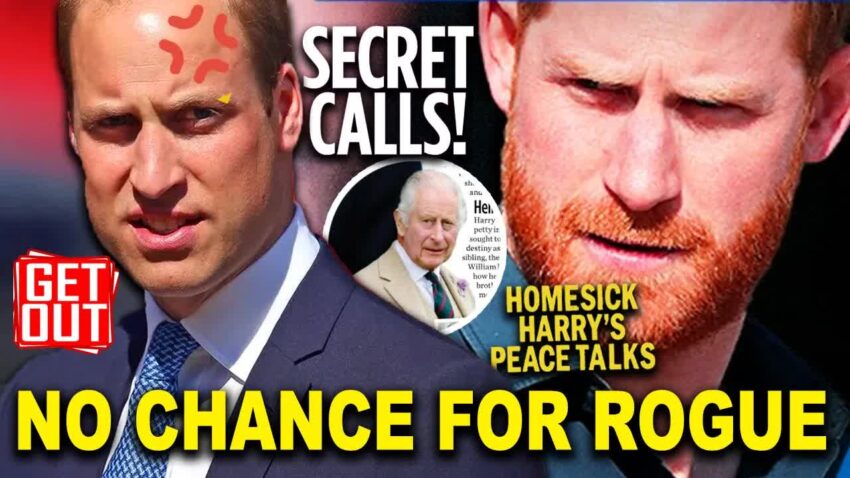After the somber occasion of Prince Philip’s funeral at Windsor Castle in April 2021, a poignant moment emerged between King Charles and his estranged sons in the Garden of Frogmore House.
In a heartfelt plea, King Charles implored, “Please, boys, don’t make my final years a misery.”
This intimate exchange, revealed through the pages of Harry’s autobiography Spare, sheds light on the ongoing rift that persists within the royal family.
Three years have passed since that emotional plea, yet little seems to have changed in the strained relationship between Prince William and Prince Harry.
Harry’s recent visit to the UK, prompted by King Charles’s cancer diagnosis, marked the first face-to-face meeting between father and son in 17 months.
However, despite this significant occasion, William made it clear that he had no intentions of meeting with Harry during his brief 24-hour stay.
The New War of the Windsors is fraught with pain, disappointment, and betrayal on both sides.
As King Charles undergoes treatment for an undisclosed form of cancer, the burden of reconciliation now falls upon William and Harry.
Courtiers speculate that William may need to set aside his pride for the sake of his family and the nation, while King Charles yearns for his sons to reconcile.
The prospect of brotherly reconciliation and forgiveness appears daunting at this juncture.
William is known for his stubbornness and fiery temper, while Harry is quick to take offense and adopt a defensive stance.
Harry’s memoir, filled with petty jabs and self-pity as he distances himself from his role as the spare to William’s heir, has further strained their already fragile relationship.
Harry’s public accusations against William, including labeling him as his arch-nemesis, and recounting confrontations such as the broken dog bowl and necklace, have left a trail of bitterness and resentment.
His relentless efforts to undermine his older brother have left many observers disheartened, especially considering Harry’s initial departure from the UK with Meghan Markle was perceived as a fresh start.
Amidst these revelations and attacks on William’s wife, Catherine, it remains questionable whether William can ever trust Harry again.
The depth of betrayal felt by William, exacerbated by Harry’s revelations to the media for personal gain, has created an irreparable breach of trust.
While King Charles seeks reconciliation, William’s resolve to distance himself from Harry remains steadfast.
The recent meeting between Charles and Harry in London, without Queen Camilla present, symbolized a tentative step towards reconciliation.
Both men reportedly found the encounter therapeutic, yet the subsequent public disclosure of details by Harry to ABC’s Good Morning America raised questions about his sincerity and commitment to rebuilding trust within the family.
As Harry and Meghan navigate their post-royal life, their actions continue to evoke controversy and speculation.
From changing their children’s last name to Sussex, to orchestrating grand entrances and elaborate plans for future events, their calculated moves hint at a strategic agenda.
The couple’s return to the UK, coupled with ambitious initiatives and media presence, underscores their complex relationship with the monarchy and the British public.
Meanwhile, Graham Smith, CEO of the anti-monarchy group Republic, stirs debate with his upcoming book “Abolish the Monarchy: Why We Should and How We Will.”
While Smith advocates for a republic, emphasizing common arguments against the monarchy, his provocative stance faces resistance from staunch supporters of the royal institution.
In the midst of royal turmoil and societal discord, the enduring significance of the monarchy to the UK and Commonwealth remains a point of contention.
While Harry and Meghan’s actions have sparked debate and division, the fundamental role of the monarchy as a symbol of tradition and unity endures.
